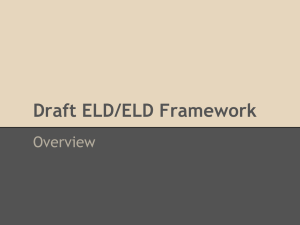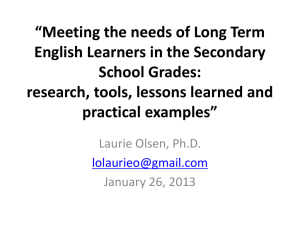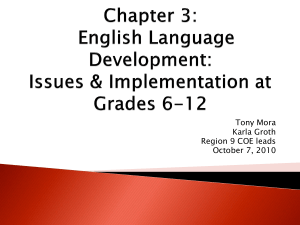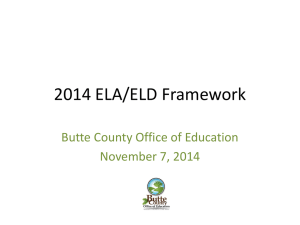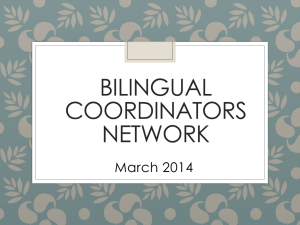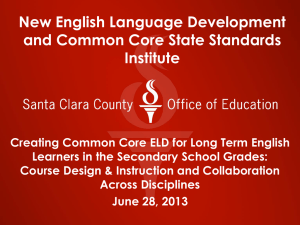Campbell USD Team B V - Multilingual Education Services
advertisement
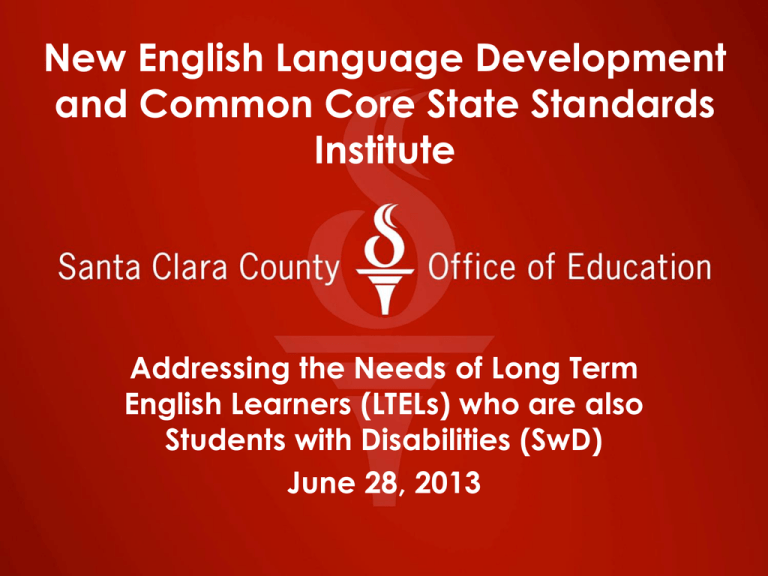
New English Language Development and Common Core State Standards Institute Addressing the Needs of Long Term English Learners (LTELs) who are also Students with Disabilities (SwD) June 28, 2013 Introductions Debbie Jaggers-Baccino Denise Kilpatrick Maggie Spehar Campbell Unified School Districts’ Journey to Meeting the Needs of English Language Learners with Disabilities 2 Goal Prepare every English Learner for college and career success! 3 Objectives • Understand the importance of having a growth mindset • Use data support decisions for LTELs with Disabilities • Provide Professional Development to administrators and teachers to support LTELs with Disabilities • Require explicit English Language Development (ELD) instruction for all students, including LTELs with Disabilities • Understand that coaching benefits teachers and LTELs with Disabilities 4 Growth Mindset The Special Education and Areas to be considered ELD Departments came using a growth mindset together and realized that we could be doing more • Core Curriculum for our LTELs with • Assessment Disabilities. • IEP goals • Coaching 5 Our Core Team • • • • • Special Education Director ELD Administrator Program Specialist Special Education Equity Coach CELDT Coordinator 6 Data Drove Our Decisions • • • • • • CELDT Data State Data Benchmark Formative Data Cognitive Data Informal Data 7 CUSD Alternate Assessment 8 Professional Development • • • • • • • IEP Goal Writing and Monitoring ELD Services Administration Training GLAD Systematic ELD ADEPT CCSS 9 IEP Testing Accommodations 10 ELD Program & Service Models for EL Students in Special Education in CUSD ELD is a core subject for English Learners • English Language Development (ELD) Settings English Language Mainstream (ELM) English Language Instruction (Pull Out) Structured English Instruction (SEI in SDC) • Methodology Specially Designed Academic Instruction in English (SDAIE) • Support SDAIE Systematic ELD Guided Language Acquisition Design (GLAD) 11 How to Document Programs, Services & Instruction on IEP Programs: Indicate on IEP what type of EL program the student will be in, such as SEI, ELM, or alternate program Services: Indicate on the IEP if the student needs primary language support or other services to be successful Instruction: Indicate where the instruction will take place (SPED classroom, general education, etc.) and if the instruction will be in English or primary language 12 How to Document Programs, Services & Instruction on IEP 13 How to Document Programs, Services & Instruction on IEP 14 How to Document Programs, Services & Instruction on IEP 15 How to Document Programs, Services & Instruction on IEP 16 ELD IEP Goals 17 ELD IEP Goals 18 RATE OF TRANSFER INTO CLASSROOM PRACTICE Following Peer Coaching Professional Development 95% Workshop, modeling, practice, feedback, and peer coaching 16-19% 14-16% 12-13% 10% Workshop Workshop and modeling Workshop, modeling and practice Workshop, modeling, practice, and feedback Types of Professional Development Source: "Effective Staff Development," by Robert N. Bush. In Far West Laboratory (Ed.), Making Our Schools More Effective Proceedings of Three State Conferences. San Francisco: Author, 1984. Coaching • • • • • Special Education Equity Coach Learner Profiles Monitoring Plans for LTEL SwD Articulation High Leverage Activities 20 Explicit ELD Instruction 21 ELD Sample Lesson Plans 22 ELD Sample Lesson Plans 23 Learner Profiles 24 Sample LTEL Plan 25 ELD Instruction Structured English Instruction (SEI in SDC) • Stacey Video 26 ELD Instruction Structured English Instruction (SEI in SDC) • Laura Video 27 ELD Instruction Structured English Instruction (ELM in SDC) • Una Video 28 Our Journey Continues Collaborative Coaching Informal Coaching Additional Learner Profiles Preschool GLAD SDC/ RSP General Education collaboration for all content areas • Professional Development for Core Team, Administrators, & Teachers on Common Core State Standards and the ELD Standards • Parent Meetings for Special Education Students who are also Students with Disabilities • • • • • 29 Thank You! Thank you for attending our session. If you have any questions, please do not hesitate to contact us. Contact Information: Debbie: Djaggers-baccino@campbellusd.org Denise: dkilpatrick@campbellusd.org Maggie: mspehar@campbellusd.org 30
